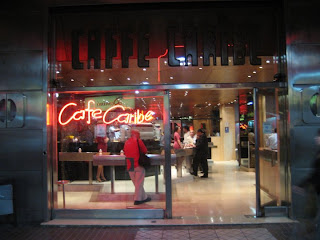6 missions, 6 teams of 2 volunteers, 1 city, 1 goal.
We had an epic race across central Santiago in search of specific sites and answers to trivia questions complete with an almost photo finish at the final checkpoint between Team LittleTang (Corrie and I) and Team Figjam (Brandy and Chris). I say almost because 20 ft from the finish line, we realized Jeremy and Sharon were already there, arriving just three minutes before us thanks to their use of the city taxis. But before this sorely disappointing revelation (as expressed on Brandy's face in this picture),
it was a neck and neck scramble from trying to find who designed a train station by asking random staff at said station (in Spanish of course) to ending up on the same final train car together, busting out the doors as soon as they opened, shoving on the stairs out to street level, and skipping the crosswalks in front of oncoming traffic (I looked both ways first, I swear).
All for a gift bag full of school supplies. Still, the race was incredibly fun and Corrie and I deserve some extra points for playing hard--not taking a single cab and running the entire thing. Chris and Brandy took one cab and Jeremy and Sharon did the whole thing in one. Nothing like an Amazing Race Chile to remind you that your legs muscles need some work once in awhile. Surprisingly, mine held up pretty well for not running in who knows how long. I credit the adrenaline.
Our missions:
1. Who designed the Estación Central? Gustave Eiffel
2. Take a picture at the top of Cerro Santa Lucia.
3. Go to Plaza de Armas and take a picture with Pedro de Valdivia.
4. Go to La Vega (produce market) and find out how much for a kilo of grapes.
5. Picture at the best place in Santiago to get a Terremoto (a wine and pineapple ice cream mix): La Piojra
6. Final checkpoint: Take the metro to Salvador estación and meet at the fountain in Parque Forestal.
The top 6 finishers! Go Team LittleTang!










